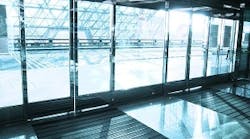We’ve come to expect automatic doors in many types of facilities. Grocery stores, hotels, hospitals, airports and convenience stores are all commonly associated with the automatic door. But automatic doors can add convenience, cost savings and an enhanced sense of customer service in many other types of buildings as well. Architects may want to consider automatic doors for building designs where they may not traditionally think of them. The American Association of Automatic Door Manufacturers has identified 6 situations where architects may want to consider automatic doors.
|
1) |
For older demographics. When buildings are in neighborhoods with an older demographic, such as near a retirement community, automatic doors can provide a huge competitive advantage. Retail stores, movie theaters, and restaurants that welcome customers with an auto open and close door are much appreciated by those who may be dealing with disabilities, canes, and walkers. |
|
2) |
For high traffic. Entertainment venues, educational facilities and public transportation stations that get large rushes of crowds at peak times can benefit greatly from automatic doors to help ease the funnel of people coming and going. |
|
3) |
When space is limited. Sliding automatic doors do not need to accommodate for the space needed for the swing of traditional doors. They are a great way to maximize space in compact areas, while also adding convenience for pedestrians. |
|
4) |
For lower cost ADA compliance. It is often more effective and cost efficient to install automatic doors, than it is to implement other architectural ADA requirements. Low-energy swinging doors offer a cost effective solution to providing universal accessibility, while allowing able bodied traffic to use the door as a manual, swinging door. |
|
5) |
To save energy. Automatic doors can reduce wasted energy and may significantly lessen heating and cooling costs. Automatic doors open only when triggered and then close afterward. This eliminates the incidence of doors being left open accidentally or not shutting completely, which allows heat and air conditioning to escape. |
|
6) |
For premium convenience. Studies show businesses with automatic doors are perceived by consumers to have a higher level of service than those that do not. An automatic door can be a great a way to help position a company a step above. |
